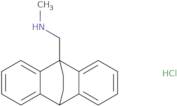Benzoctamine HCl
CAS: 10085-81-1
Ref. 3D-FB32171
| 5mg | Discontinued | ||
| 10mg | Discontinued | ||
| 25mg | Discontinued | ||
| 50mg | Discontinued | ||
| 100mg | Discontinued |
Product Information
- 1-(9,10-ethanoanthracen-9(10H)-yl)-N-methylmethanamine hydrochloride (1:1)
- 1-Methylaminomethyldibenzo(b,c)bicyclo(2.2.2)octadiene hydrochloride
- 9,10-Ethanoanthracene-9(10H)-methanamine, N-methyl-, hydrochloride
- 9,10-Ethanoanthracene-9(10H)-methanamine, N-methyl-, hydrochloride (1:1)
- 9,10-Ethanoanthracene-9(10H)-methylamine, N-methyl-, hydrochloride
- 9-(Methylaminomethyl)-9,10-dihydro-9,10-ethanoanthracene hydrochloride
- Ba 30,803
- Benzoctamine hydrochloride
- Benzoctamine hydrochloride [USAN]
- N-Methyl-9,10-ethanoanthracene-9(10H)-methylamine hydrochloride
- See more synonyms
- Tacitin
- Tacitine
- Tracitin
- Unii-1C280S920Q
Benzoctamine HCl is a drug that has been used to treat psychiatric patients. It acts as a depressant, and has been shown to have a significant effect on the central nervous system. Benzoctamine HCl binds to receptors in the brain and blocks their activity. Animal experiments have shown that chronic use of benzoctamine HCl leads to neuronal death in the brain, which may be due to its ability to inhibit dopamine production. Clinical studies have also shown that benzoctamine HCl inhibits sucrase activity in animals, which may lead to an increased risk of diabetes in humans.





